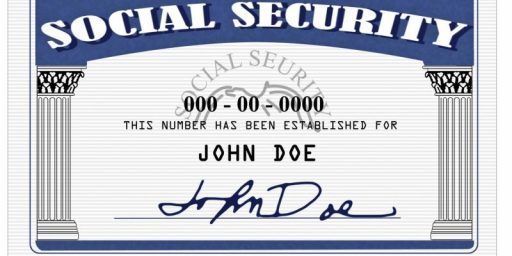Military Retirees May Lose Double Dip Retirement
The Pentagon is considering making military retirees ineligible for civil service pensions.
The Pentagon is considering making military retirees ineligible for civil service pensions.
Federal Times (“An End To Civilian Pensions For Military Retirees?“):
To address long-term sequester cuts, the Defense Department is mulling numerous reductions that will affect civilian employees, including doing away with civilian employee pensions for military retirees who go back to work for the government as civilian employees.
The savings could be almost $100 billion over 10 years when combined with a halt to commissary subsidies and restrictions on the availability of unemployment benefits, Defense Secretary Chuck Hagel told reporters last week in summarizing the recommendations of the newly completed “Strategic Choices and Management Review.”
[…]
As of March, more than 134,000 military retirees held civilian jobs at DoD, according to the Office of Personnel Management. For the Pentagon, axing civilian pensions would save money by reducing the amount it has to contribute into the Federal Employees Retirement System and the Civil Service Retirement System, said Larry Korb, who oversaw manpower issues as an assistant Defense secretary during the Reagan administration.
While Korb does not take the idea seriously, he sees it as an attempt by DoD to draw attention to a pension program that often lets soldiers, sailors and airmen retire from the military after 20 years, then return to DoD as civilian employees making more money for doing the same job.
Hagel did not say how aggressively DoD would seek to implement such a step or how much it could save. A Pentagon spokesman later declined to provide additional detail.
But the head of the National Active and Retired Federal Employees Association (NARFE) blasted the idea as “ill-conceived and completely unfair.”
“No civilian employee should receive lower total compensation because they served in the military, ever,” NARFE President Joseph Beaudoin said in a statement. “This proposal should be rejected completely as an option, even under the worst budget scenarios.”
Once upon a time, military officers who retired at pay grade O-4 and above (major/lieutenant commander) were ineligible to be hired into the civil service unless they waived their pensions. We got rid of that restriction because it was not only unfair (essentially penalizing people for two decades of service) but stupid (depriving the government of proven, experienced leaders).
Regardless, there has always been a tension between military retirees and others in the civil service. My dad was a retired senior NCO and thus not subject to the restriction but always felt like he was discriminated against. At least in those days (circa 1986) retirees were not eligible for the 5 point hiring preference given to ordinary veterans (such as myself) or the 10 point preference given to disabled veterans (such as him). Additionally, whereas military service time counted towards one’s time in government services for retirement, vacation, and other benefits if you were an ordinary veteran, it didn’t if you were drawing a retirement pension.
On the civilian side, though, the civil servants who had little or no military background resented former military coming in well into the grade structure and often having outsized influence because of their military experience and/or network. Additionally, there was an extra dose of resentment reserved for those drawing a generous military pension in addition to their civilian salary, especially from civil servants who had just as much service time.
Ultimately, though, the “double dip” argument was always silly. That one can put in twenty years of service in the military and retire with a nice pension is hardly a state secret. Nor is it particularly onerous to qualify to enter into that path, especially if you’re healthy. Nor is it obvious why it’s problematic for someone who is going to get a pension regardless of whether or where he works after “retirement” to be allowed to compete for vacancies in the civil service. Yes, they’re getting two paychecks from the government. But they’re going to get one regardless and only get the second because they’ve taken a second job.
There is, of course, the issue of cronyism. When a retiring colonel winds up being selected as the “best available candidate” for a civil service position that just so happens to have a job description which exactly matches his last active duty position, there’s a natural suspicion that the fix is in. But there are ways to minimize this problem–and it’s really tangential to cost savings.
The bottom line, though, is that there’s no legitimate argument to be had for denying a second pension to someone who legitimately earns his first pension in uniform and then legitimately earns a second one after twenty or twenty five more years of service in civvies. That’s especially true since, nowadays, the civil service retirement system amounts to a 401k rather than a military-style pension.







The pension issue is secondary to the double-dipping of collecting a pension and a paycheck at the same time, which isn’t allowed elsewhere in the Federal bureaucracy (and has only been allowed w/o restriction, I think, since about 2000.) A retired ambassador can’t do that, but a retired veteran can. That gets costly fast and breeds a lot more grumbling than the two-pension issue.
I always considered this an additional benefit of the military…put in your time and then go do something else.
Cops do it all the time. Put in your time in NYC…then retire to someplace quiet in Florida and draw a second salary.
90 members of Congress do it…so I would expect them to outlaw it with a Congresssional exemption…any minute now.
Careful there, denying people pensions is time honored tradition. You’re sounding like some kind of socialist with this “earns a [pension] after twenty or twenty five … years of service”
Whether it be through bankruptcy, renegotiating under the threat of bankruptcy or some other means, workers who accepted a promise of a pension were fools and deserve to have the terms of that promise changed before it is time to pay out.
I’ve seen way too many of the cronyism examples of O-5s and O-6s retiring and then returning to a similiar civilian position that “just happened” to have opened up when they retired, and that they beat out all the other qualified candidates. Wink wink, nudge, nudge.
The old rule (pre-1995) was that those officers (O-4s and above) had to forfeit 50% of their military retirement payments to take a civil service job. Naturally almost none of them did, instead opting to go work as contractors if they wanted a big paycheck. Today, many of them opt to slide across and come back as GS-14s, 15, or SESs. This, particularly in the DoD, has created a ‘glass ceiling’ for most non military retiree career employees who aspire to break through to the senior ranks.
The only good thing about this is that those former Colonels are now at the bottom of the pile when a new round of RIFs hit, which can be as early as next year. They have no seniority, many of them are still conditional employees on probation, and would be some of the first to be let go in the RIF.
This also seems like a great way to cut the pool of very well qualified, very disciplined job applicants.
@Tom Nichols: It isn’t allowed elsewhere, by ambassadors and whatnot, because they’re part of the civil service. But the military is a completely separate system. Maybe it shouldn’t be?
@Gustopher: I’ve long argued that pensioners ought be first in line at bankruptcy.
@DC Loser: That’s indeed a problem and one that I’ve faced time and again as an outside applicant for various DoD positions, whether civil service or in PME schoolhouses. The problem is that I have no idea how to separate true cronyism from hiring honest to goodness outstanding performers back into the system.
@Gustopher: Yes.
In addition to changing the pension rules, the disability rules changed whereby one could collect retirement and disability. This is called concurrent receipt. There are not a few that collect disability, retirement, and civil service pay. And I’m not talking about combat related disabiltiy but disabiity ratings for back backs, sleep apnea, and other issues of just getting older. All of these have greatly added to the budget.
@Scott: That’s interesting. They talked about doing that for years but it seemed they’d never get around to it precisely because it was expensive.
My dad was a military 20-year retiree and was later given 40 percent disability for various ailments considered “line of duty.” But all that meant was that 40 percent of his pension was taken away and instead paid dollar-for-dollar by the VA. So, the only cost to the government of the disability pay was that it wasn’t subject to federal income tax.
The various veterans’ groups always maintained that this was unfair. They argued, not unreasonably, that it was odd that someone who served three years should be able to get disability benefits for life but that someone who served twenty effectively had those benefits taken away. Indeed, the only argument ever advanced in the other direction was that paying people both a pension and disability payments was expensive.
@James Joyner:
Check out the photo at the top of the post and compare it to this image from the cover of The Replacements Pleased To Meet Me.
I prefer The Replacements version, but then again, I believe that Paul Westerberg may be the optimal human produced in the last quarter of the 20th century. I may be biased.
Some states let teachers 2 dip, especially when there was a big shortage a while back. Now most of them have stopped, but teachers can still cross the state lines and do it that way, or go into some other work like at McDonald’s when they start paying those $15/hr wages . There will be a lot of people going into burger flipping when and if that happens. Think of it: going into McDonald’s and not seeing workers with acne or hearing aids.
@Tyrell:
This is already true. The median age of all fast food workers is 28, while the median age of a female fast food worker is 32. The stereotype that all such workers are teenagers or senior citizens is, therefore, just that — a stereotype, and false. Most fast food workers are adults in the prime of their lives, many of whom are married and supporting families.
@C. Clavin:
Cops and Firefighters do. Most have pension plans that allow them to retire in their early-mid 50s and many of them go on to work other jobs. There is one complicating factor – here in CA a majority of police and fireman go out on disability retirement – this protects their income on a tax basis, however it might present a problem with respect to future employments and their current disability status.
@al-Ameda:
Assuming that they are able to find a brand new job in their early-mid 50s, that is. The job market for people that age isn’t that robust, especially ones coming into a new career.
What’s a firefighter with 20 years experience know how to do? Be a firefighter. That doesn’t always translate well into getting a new job as not-a-firefighter at age 50.
@al-Ameda: Heck, here in Texas, our Governor draws a state pension in addition to his Governor’s salary.
@Rafer Janders:
More or less. The problem is not that a large number of pensioners are going to manage to find a second job, but that pensioners with connections can spot a second job, mostly in the public service. Here in Brazil, there are public institutions where there is a large number of pensioners with connections, working in political posts. And many of them are clearly senile to perform these jobs. And if your current job is not your main source of income, there are less incentives to be good at it.
There is another question: pensions were created because many seniors were thrown in the poverty when they could not work anymore. If people are getting pensions and then being able to get a second job there is a good question about both the affordability of the system and if there are better ways to spend the money. One could easily argue that teachers should earn more, and retire later in life, and that society as a whole would be better off.
@Scott:
Many years ago, here in CA, we had a Lt Governor, who was drawing an FBI pension while serving the state. It’s more common that people think.
Two things …
1) As a very soon to be military retiree, I can unequivocally state that while generous, most people with families can not even consider actually “retiring” on a military pension. (54% retirement pay actually works out to paychecks about 1/3 of my total active duty pay). So basically, I need another job .. and a decent one at that. In my career field (weather) civil service (either NWS or DoD) are where most of the jobs are. Why should I be excluded from being compensated for one of those jobs just as any other employee would be, simply because I’ve spent 20+ years of my life going on Uncle Sam directed “vacations” to “exotic locations” around the world?
2) On the issue of cronyism, I think you can look it from a couple of different angles. Sure to someone who wants a certain job, it certainly does seem unfair that a recent retiree from that office gets it. However, if I’m the one hiring to fill said job, who better to employ than a guy that can hit the road running on day one, no additional training required?
p.s. As for the headline, I view that one about the same way I did the story a couple of years ago about how the DoD was planning to radically change the whole retirement system .. even for those currently serving.
It’s not entirely out of the realm of possibility, but it is highly unlikely. 🙂
I know this is important to lots of folks as our friend Todd explains just above. But how big a story is it if one is ACTUALLY “outside the beltway?”
@Todd: “Retirement” is what everyone in the military calls it but, especially for a non-com, I agree that it’s a misnomer. A general can truly retire off his pay; an E-7, not so much. Although, ironically, it’s much easier for the general to not only find a job but immediately far exceed his active duty pay.
And, yes, the benefits to the hiring authority of cronyism are undeniable. Hell, I see it even in the nonprofit world, where unpaid interns are frequently hired for low level paid gigs not because they’re the best candidate for the job but because they’re good enough, don’t need training, and no real search is needed.
@Todd: At most, I could see this being applied to new hires. I agree there’s no way we take away benefits retroactively.
@JohnMcC: Well, the federal government is far and away the biggest employer in the country. And while a lot of those jobs are concentrated inside the Beltway, most aren’t.
@Todd: Why should taxpayers support you with 2 full checks? When you’ve done your time, it’s time to take that experience out into the private sector. Many retirees feel entitled to continue being employed by the federal government their entire working lives when their skill set isn’t particularly unique to the military. In other words, they can find private sector work. I hate to use a broad brush, but frankly, double dippers aren’t worth their price to the taxpayers. You get minimum effort and little to no initiative in making their piece of the organization run efficiently. “Once hired….retired” is frequently mentioned when a retiree becomes a civil servant. Are there exceptions…absolutely. But I assure you…they ARE exceptions. Else the DOD bureaucracy wouldn’t have the reputation for incompetence that it does. If I had a dollar for every retired NCO or officer who is now a GS13-15 and retarding innovation and efficiency I could pre-pay my kids college tuition.
@Pharoah Narim:
We obviously have had polar opposite experiences when it comes to the DoD civilians we’ve worked with. In my own workplace it definitely has a negative impact on our mission support when they are forced to take a furlough day every Friday. The civilians I work with are a huge asset to our organization.
As for taxpayers “supporting me” ….
Ummm, it’s not charity.
Being in the military for a couple of decades usually involves living a fairly unique lifestyle. I don’t feel at all as if I’m being “given” my retirement pay.
And should I move on to the civil service world (as I said above, that’s where the majority of jobs in my field exist) I do expect that I’ll actually be required to, you know, work, for whatever compensation I may receive.
I really don’t understand this perverse idea some people have that a dollar earned in the private sector is somehow more “noble” than a paycheck earned in service to the public.
@Tyrell: “Some states let teachers 2 dip, especially when there was a big shortage a while back. Now most of them have stopped, but teachers can still cross the state lines and do it that way, or go into some other work like at McDonald’s when they start paying those $15/hr wages . There will be a lot of people going into burger flipping when and if that happens. Think of it: going into McDonald’s and not seeing workers with acne or hearing aids.”
That’s a bit different.
@Todd: Unless your job is pulling triggers or one to two levels of support deeper–your job isn’t fairly unique at all beyond a move every several years and all the additional “training” one must have so the top brass’ ass is covered when someone screws up (i.e. sexual assualt “training”). You mentioned Weather and Combat Weather is indeed unique.
There are probably 10-13 people in support of the folks that execute and directly support combat operations. These jobs are directly transferable to the private sector and retirees in these jobs should take them IMO…not because they are more noble but because it keeps a better mix of background diversity in the total force. It also means the tax burden undertaken by tax payers reaches a greater amount of people. If you are getting 2 checks of rightful compensation, that’s 1 check someone that could do the job (who isn’t already being compensated by taxpayers) won’t get.
For the record, I believe the whole public/private sector argurment is a false dichotomy. EVERY dollar in existance carries with it a debt burden of principle plus interest to the Fed so it doesnt matter. My postion is that double dipping encourages senior leaders to create positions for themselves to fill post retirement, whether those position are indeed necessary, are better left as military postions, or is worth the value the taxpayer gets in return is questionable at best. For those positions that ARE neccessary and are able to be performed by non-military, its is better for our economy if more room is made at the gov’t teet for non-retirees. Some positions in the military are unique and won’t be able to be performed by career civilians–I get that. But that isn’t the case in a larger percentage of instance.
@Pharoah Narim:
Maybe I’m just out of touch, but it seems to me that even when we’re talking about govenment jobs, the person who is best qualified for the position is the one who should be filling it. I just can’t wrap my head around your supposition that it’s “better” for the economy for someone like me to work in the private sector, while someone else fills a government position for which I’m perfectly qualified, simply because they’re not getting a retirement check. The same amount of money will still be spent by the govt either way … my retirment check + the civil service position’s salary … regardless of whether it’s me or someone else doing the job.
BTW, just out of curiousity, if I was to get a job with a govenment contractor, would you consider the “private sector” or still “public sector”?
@Pharoah Narim: @Todd: Indeed, it’s quite arguable that hiring military retirees saves the government money, in that the hire doesn’t have to depend on his second salary for the entirety of his livelihood. A retired colonel making $52,000 a year “just for breathing” (as a retired SF buddy of mine liked to put it) can easily afford to take a smaller salary than might be needed to attract a single-income individual with comparable skills and life situation. I can preach it either way as to whether that’s a good thing.
Are you kidding?? Put on the uniform, deploy and get shot at or try to sleep while rockets are landing around you while you are away from your family then tell me I don’t deserve to be able to retire and then get a good job with the government. PLEASE; you can stay with other agencies for 30-40 years and then retire; you cannot do that in the Military because your body will not stand up to the abuse it takes to be a Soldier.
@Todd: Easy, 2 people being compensated will allocate funds throughout the economy more evenly than 1 person with compensation equal to the two. If you don’t agree, then you also must feel that a Mitt Romney type earner is more stimulative (to the real economy anyway) than 1000 families earning a sum equal to his. It’s not BTW.
A government contractor job to me is a “private” sector job and allows the government the ability to easily get rid of lugs that believe that because they’ve retired from service they’ve uniquely earn the right to coast into a second pension. I see no problem with that. Heck, if a retiree works hard as a contractor and their performance earns them a chance to convert to a civil service position….good! The Taxpayer is getting value for their investment.
I think it’s also a little bit egotistical to believe there is only one candidate for a position that is perfectly qualified. Often times, the handful of perfect candidates don’t even get considered because of hiring preferences or “Franken” job descriptions written to purposely favor the military person performing the job. It’s not too uncommon for this to backfire and the retiree is NOT the best candidate and can’t be hired justifiably over the real best candidate(s)…. then the position vacancy is mysteriously “canceled” and readvertised later. Rinse and repeat (i.e. rewrite the position description to eliminate the previous better qualified candidates) until the retiree can be justifiably hired.
@Pharoah Narim:
Ok, so to sum it up: *most* prior military civil servants are lazy good for nothing slouches who don’t really deserve the job … which isn’t a “real” job btw .. just a cushy chair to hang out in while they coast into that second pension 20 odd years down the road.
Got it.
So yea, I really don’t think there’s a lot left to “debate” here, as we seem to have dramatically different views of the landscape. Just to be clear, I don’t doubt or deny that there are certainly some former military GS employees who are exactly as you describe … it’s just that in my experience they are by far the exception rather than the rule.
p.s. am I reading too much into this, or did you not get selected for a government job(s) that you wanted (and felt you were the best qualified for) at some point?
@Todd:
I think you oversimplified my position but that’s fine. You came to your conclusions based on your experiece as I did mine. I have the opposite experience as you and I have a laundry list of DOD organizations I’ve been associated with and exposure to a broad spectrum of career specialites.
I don’t believe I painted retirees with a broad brush. I said that competitions for these positions were non-competative to truly finding the best candidate. I know because I’ve had to not hire the best candidate because of prefrences or cancel a position because we’d have to hire someone that wasn’t the soon-to-be-retiree the position was created for. I also said that economically it was counter-productive and not the best for the health of a well rounded organization. A commander can be the best ever for a unit, but we still force them to move on so we can get fresh eyes on the mission. Im not taking about your GS 9 and below who are just the folks that load the wagons. Im refering to the management grades 11-15.
I take my own advice, spent my time in uniform and moved on as there is nothing particularly unique about my job other than I was asked to do it in dangerous, life-threatening places. Unlike others that feel this experience entitles them to every bit of Gov’t largesse they can get ahold of–I take the opposite view: I volunteered and was compensated for my services–uncle sam doesn’t owe me anything but medical for line of duty conditions.
I understand how the game is played because I was tasked to fill civilian vacancies from time to time and was told who would be the “perfect candidate” before I reviewed a single resume. Have little to no desire to be a gov’t civilian unless the job was right and made a difference to the warfighter–I have yet to see that job advertised. I do quite well though helping “perfect” (management)hires straighten out the messes they make because they don’t know their fields well enough to handle non-routine duties or adapt to changing paradigms.
I put 33 years in the uniform and am now 8 years into my civil service job of providing Information Technology Services to 70,000 soldiers, government civilians, contractors and family members. I am doing exactly what I was doing as a soldier and am imminently qualified to do this job for numerous reasons; a few of those reason are, 1. I know what soldiers need and understand their mind set; 2. I understand the nature and importance of the mission; 3. I know that everything I do impacts soldiers and that I am an extension of their success or failure in meeting their mission goals; 4. I have a son (Army) and a daughter (Air Force) in the military and they depend on me every day, no matter where they are in the world. My recommendation is that Senators and Representatives not get any of their payout until they hit retirement age. My understanding is that they receive a life time stipend even if they only serve one term? Todd by the way, I admire your fight but there is no way you are going to convince the ones that have made up their mind about military personnel.
@Tom Nichols:
as off this time I get retired navy pay but I retired as a RM2(SW) E-5. Plus I retried on civil service disability back in 2006. I spent 15 years working in civil service. but being a retired E-5 I do not get that much to begin with and as far as civil service I get a GS-5 pay so that is not much at all. but to tell me this man wants to stop what we get I worked my tail off to get what I have and no one is going to take away what I have earned.
If at the same time they make Congressmen and their spouses ineligible for civil service positions
and lobbying their former colleagues, heck, it might be worth it.
Fll disclosure: I am an expensive one…
1. Retired O-5, regular retirement but pretty much had to, see #3
2. Current 15. Though did not retire in same job or even org, nor at this grade did I start
3. Disability recipient, though frankly would rather have retained all my natural body parts
I believe I earned all I have.
Cronyism is everywhere. All three SESs in our org never spent a day in uniform, nor did their predecessors, two of which retired from govt service only to have their successors hire them back as consultants.
Seems to me if the govt is going to hire someone into a position and pay them a pension anyway, how is there am additive cost to the govt whether or not the recipient also has a military pension which they have whether they get the job or not?
@Todd: in my experience, 90% of retired military work just as hard as they did on active duty and outwork and out perform 90% of career civil servants. There are always exceptions, but that has been my experience.
@Steve: also, while I agree with those that think this unlikely, even if it were to occur, it would be grandfathered right? Would seem the right thing to do but would not provide any immediate benefit to the cutters unless not grandfathered?
@Mario LaMaestra:
first things first, take away the benefits from Congress and the house first , include insurance than worry about us rest. let the shit run down hill. if u can take it we can too.